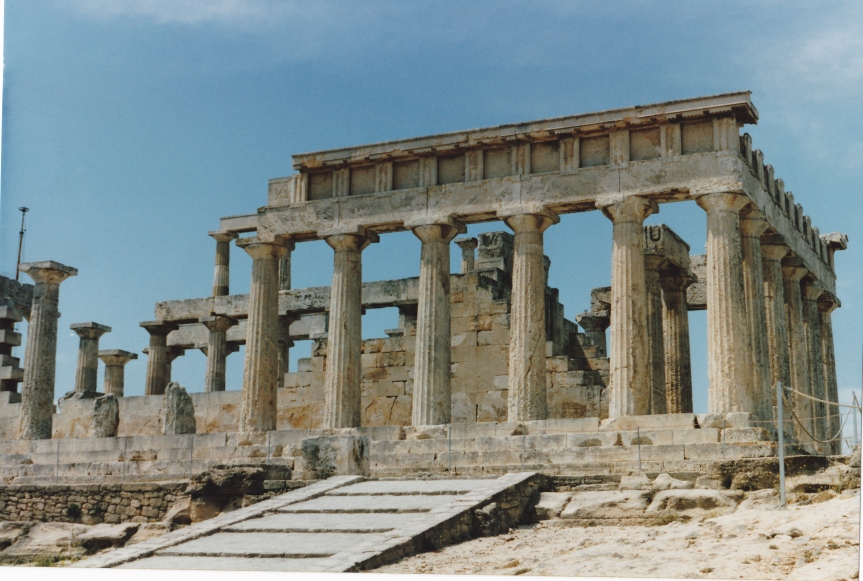Travel can provide countless opportunities to get up-close and personal with strangers, to participate in how other people live their lives and gain an appreciation for new ways of doing things. The experience can be intoxicating, educational, even fun, but more than likely, as tone-deaf tourists are thrown against the barriers of language, can result in some rather awkward moments.
In our first experiment with travelling together, Larry and I journey to Greece.  We spend a few days in the sprawling metropolis of Athens gaping at the ancient ruins of the Acropolis and the Parthenon, and rummaging for deals in the ancient market. Caught in the throngs thrusting their way between tightly packed stalls, we are swarmed, hustled, and pick-pocketed by refugees, who have fled trouble in their own country, only to instigate it in another.
We spend a few days in the sprawling metropolis of Athens gaping at the ancient ruins of the Acropolis and the Parthenon, and rummaging for deals in the ancient market. Caught in the throngs thrusting their way between tightly packed stalls, we are swarmed, hustled, and pick-pocketed by refugees, who have fled trouble in their own country, only to instigate it in another.
 The owner of the hotel bemoans this influx of lawless humanity altering the social dynamic of his beloved city, and advises us that he now carries his money in a false bottom of his shoe. With the alarm of societal insecurity ringing in our ears, we eagerly climb aboard a ferry headed to Aegina, seeking the more relaxed vibe of island life.
The owner of the hotel bemoans this influx of lawless humanity altering the social dynamic of his beloved city, and advises us that he now carries his money in a false bottom of his shoe. With the alarm of societal insecurity ringing in our ears, we eagerly climb aboard a ferry headed to Aegina, seeking the more relaxed vibe of island life.
The ferry arrives at high noon, the sun blazing in the cloudless sky with dazzling rays of light reflecting off the water and bouncing off the white washed houses. It is a public holiday, May Day, and the ferry is packed with Athenians intending to spend the day frolicking on the beaches, sampling grilled octopus and drinking ouzo.
 We wait for a local bus but when several pass by, stuffed full of holidaymakers, we decide to rent a tiny motor-scooter for the week, so we can zoom around to the various points of interest on the island at our leisure. We drive over to a little fishing village on the west of the island. Our hotel is apparently still under construction, a concrete stairway leading to the open deck of a second floor with metal rebar pointing towards the sky. There is no reception desk and no one to be found. We appear to be the only guests. A neighbor sees us wandering around and offers to locate the hotel proprietor, who roars up on his motor scooter, trailing a cloud of dust. He shows us a room on the ground floor. The room is large and airy, with tiled floors, simple furnishings and a clean bathroom, so we settle in happily.
We wait for a local bus but when several pass by, stuffed full of holidaymakers, we decide to rent a tiny motor-scooter for the week, so we can zoom around to the various points of interest on the island at our leisure. We drive over to a little fishing village on the west of the island. Our hotel is apparently still under construction, a concrete stairway leading to the open deck of a second floor with metal rebar pointing towards the sky. There is no reception desk and no one to be found. We appear to be the only guests. A neighbor sees us wandering around and offers to locate the hotel proprietor, who roars up on his motor scooter, trailing a cloud of dust. He shows us a room on the ground floor. The room is large and airy, with tiled floors, simple furnishings and a clean bathroom, so we settle in happily.
Squeezing close together on the little scooter, we cruise east of town. We can see miniature chapels and tombstones dotted across the hillside.
 These are the remains of the town of Paliohora, where the original townspeople built over 300 chapels to various Greek gods, who evidently did little, in the end, to protect them from being ransacked by pirates and forced into slavery.
These are the remains of the town of Paliohora, where the original townspeople built over 300 chapels to various Greek gods, who evidently did little, in the end, to protect them from being ransacked by pirates and forced into slavery.
We putter up to a mountain top, one of us getting off to walk when the two-stroke motor can’t quite muster enough power to get us both up the steeper grades. Located on one of the highest points of the island, with a spectacular view of the Saronic Gulf, is the temple of Aphaea. This classic Greek structure was built in 480 B.C., in honor of the Goddess Aphaea, a woman of unsurpassed beauty and a proclivity for refusing the offers of matrimony from local fisherman. One day, in order to avoid yet another marriage proposal, she runs away up the mountaintop and mysteriously disappears. According to the legend, her beauty attracted the attention of the gods, and they take her up into the heavens to live with them. Her lovelorn suitor sets about to build the temple in dedication to her memory.
As we wander around the towering edifice, admiring this remarkable labor of love, gleaming in the sunshine for 2500 years, I wonder why that forsaken fisherman would go to so much effort for a runaway bride. I picture that hapless, spurned sailor sitting in his local tavern each night, crying into his ouzo, ribbed merciless by his fellow fishermen about “the one that got away”. If only he could come up with a good explanation for her disappearance! Maybe then the endless teasing would stop. I imagine that one day he walks by the town of Paliohora and, seeing all those 300 chapels dotting the hills, is struck by a fantastic idea. He could tell all his buddies that the gods took her! I mean, the Aeginans obviously take their god-reverence pretty seriously. It just might work! So, he spins his tale about the gods being enchanted by her beauty, and taking her up to heaven for themselves. And I can believe that those bone-weary fishermen, living on the edge of the gods’ mercy and wrath every day at sea, are easily convinced of such fickle deity behavior.  To remove any shred of lingering doubt, the lovelorn suitor cements his theory into truth and legend by building the temple. Then, I conclude, his manly honor and self-respect is restored, and he can hold his head high in the tavern once more.
To remove any shred of lingering doubt, the lovelorn suitor cements his theory into truth and legend by building the temple. Then, I conclude, his manly honor and self-respect is restored, and he can hold his head high in the tavern once more.
Well, Goddess Aphaea may not have appreciated a good fish dinner, but we certainly wanted to sample the local catch of the day. So, we meander down to the harbor to watch the fishermen docking their boats for the night. They haul crates of fresh fish onto the pier, as the owners from each of the handful of restaurants come out to haggle over the cost of their catch. Armed with their evening’s menu selections, they return to their kitchens. We chose a restaurant and are seated at an outdoor table, covered with a red-checked tablecloth, overlooking the water. I tell Larry that the guide book described how local restaurateurs will take patrons into the kitchen, show them what is fresh, and let them pick out what they want for dinner. How fun would that be? So, I am thrilled when the proprietor comes to our table and invites us back into his kitchen.
The kitchen is cramped but clean, with fresh produce lined up along a butcher block counter and the fresh catch of the day still twitching on ice in a stainless steel sink. With a mixture of unintelligible words, gestures and pointing, the owner gives us a quick tour of the kitchen. We admire his wood burning oven, the stainless steel grill and the spotless prep areas. A middle-aged woman is standing against the counter cutting up vegetables. She glances up to give us a quick smile before returning her attention back to the rapid, flashing movements of her knife. A young man, wrapped in a damp apron, is elbow deep in sudsy water, sloshing big pots and pans around in the sink. The proprietor/chef proudly points out the available dinner options; some sort of large sea bass, mounds of tomatoes, feta cheese, and olives for Greek salad, and warm, freshly baked bread. We smile and nod as he talks. “We’ll take it!” I enthuse. He smiles broadly and happily ushers us back to our table. As we wait for dinner, pleasantly musing over the amazing sights we’ve seen across this jewel of an island, a look of alarm passes over Larry’s face. “Do you think we just ordered a whole fish each?” he asks. “Those fish had to be three or four pounds a piece!” I recount our moments in the kitchen, and imagine how our enthusiastic pointing and nodding could be optimistically interpreted by a clientele-hungry restaurant owner eager to sell through his dinner ingredients. “It’s certainly possible,” I conclude.
Larry turns and signals the waiter. He approaches our table and we attempt to determine just how much food we have ordered. The waiter’s face clouds over dramatically, only confirming our suspicion. We politely try to limit the portions to just one fish to share. He stalks off towards the kitchen to relate this unwelcome development. Moments later the proprietor appears, his expression decidedly less cheerful than before. He strides over to our table and, with much more expansive English than previously demonstrated, does his best to convince us that we each want our own fish. Perhaps there is not enough to share, he tells us, since Americans don’t eat the head or tail, there won’t be enough meat to satisfy our appetites. No, we insist, please, just one fish to share. With a sigh, he resigns himself to the reduced fare, and heads back to the kitchen to adjust our meal. We sit at our table, fidgeting awkwardly. The restaurant is very quiet, with only one other couple dining. They glance at us out of the corner of their eyes, and whisper exasperatedly to each other. We warily eye the salads and bread the waiter sullenly dumps on our table. Our main course arrives, baked whole, still sporting head and tail, beautifully festooned with lemons and onions. The fish is large enough to feed a famished family of six.
In a tavern that night we sit at the bar with a few local fishermen, their faces bronzed and leathery from the sun and the sea. They nod their approval when we try a shot of Ouzo, a classic Greek drink made from a combination of pressed grapes, herbs and berries. The strong anise-licorice flavor burns all the way down and within minutes dissolves my insides into a warm, numbing haze. “Another?” Larry enthuses, raising two fingers towards the bartender. The motherly woman tending bar pours two more shot glasses of the milky liquid. She reaches over and pats my hand protectively, warning me softly, “careful, careful”, her eyes glittering at Larry, clearly suspicious of his intentions. I reassure her with a smile, raise my glass in a silent toast to Goddess Aphaea and lucky escapes, and gingerly take a sip of the aperitif.


